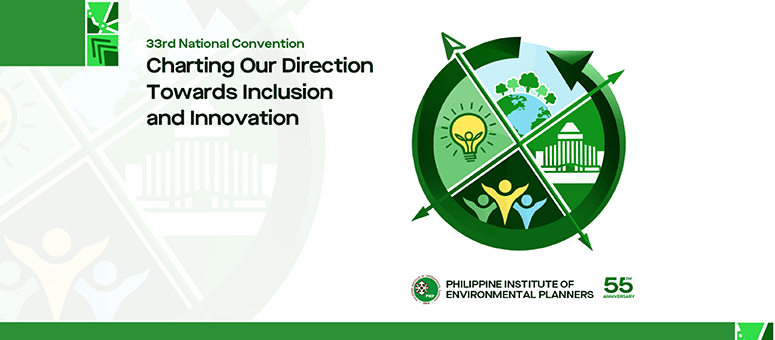As 2024 drew to a close, the Philippine Institute of Environmental Planner (PIEP) convened in November for its National Convention. Like many professional organizations, planners gathered not only to learn from experts in their fields but also to exchange best practices and experiences from each other. As such, the event served as a platform for knowledge exchange and networking, and more importantly, enabled them to shape the future of their profession and the communities they serve.
Environmental planners are not merely spatial shapers and environmental guardians, but also catalysts for equitable transformation. With the convention theme “Charting Our Direction Toward Inclusion and Innovation,” the assembly convened at a time when the world faces unprecedented challenges and concerns, including rapid urbanization, climate change, fragmented responses and initiatives, and an imperative to harness existing and emerging technologies. Thus, planners stood at the precipice of both challenges and opportunities, poised to redefine their roles in shaping an inclusive and sustainable future.

Expectations
For me, the Convention was an impetus to harness the developmental capacity of environmental planners to foster collaboration among key stakeholders, including those from the national and local governments, private practitioners, and academics, in order to better serve our communities.
By championing inclusive development and growth, planners aspire to ensure that no one is left behind in the planning process and ultimately, can reap shared benefits. However, these challenges necessitate that planners address diverse needs, including those of the vulnerable sector.
Furthermore, by embracing innovation, planners can leverage technologies that will enhance their capabilities to meet the evolving, albeit continuous, needs of our societies.
Government interventions
As the preeminent agency responsible for housing, human settlements, and urban development, the Department of Human Settlements and Urban Development (DHSUD) assumes a pivotal leadership role in driving transformative initiatives.
DHSUD has been developing inclusive and integrated strategies, programs, and plans that uphold fairness and equity while establishing dialogues, promoting resilience and sustainability, in collaboration with industry stakeholders. These initiatives aim to elevate the quality of life for all Filipinos.
Two notable transformative strategies and programs that align with the Filipinos’ national aspirations are the Pambansang Pabahay Para sa Pilipino (4PH) program and the PLANADO program.
The 4PH program, launched in 2022 and declared a flagship program in 2023, exemplifies inclusive and participatory planning in action. By addressing the housing backlog, recurring, and new needs, it empowers local government units (LGUs) and private developers to construct safe, affordable, and disaster-resistant settlements. The program emphasizes local government community engagement with residents to develop housing solutions that are not only affordable but also responsive to the unique needs of informal settler communities, the underprivileged, and the homeless.
Concurrently, cities, municipalities and provinces are expected to prepare, update, and approve risk-informed Comprehensive Land Use Plans (CLUPs) and Provincial Development and Physical Framework Plans (PDPFPs) that are responsive, resilient, and adaptable to the challenges of population growth, urban sprawl and climate change, among others. As such, the PLANADO program aims to facilitate this attainment by streamlining and digitizing land use planning that incorporates innovation and modeling technologies to achieve these targets.
Looking ahead
The environmental planning profession stands at a pivotal juncture, as planners possess the capacity to influence the design, management, and transformation of spaces and the environment.
By championing inclusivity, planners can ensure that every voice, particularly those of the marginalized, will be heard. By embracing innovation, planners can integrate data analytics and adopt technologies to make environmental planning not only dynamic but also more impactful.
The convention compelled us to advance with renewed determination. It has inspired us to lead with purpose, grounded in inclusivity and guided by innovation, as we develop a shared vision of sustainable communities that will enhance the lives of all.
* * *
This article stems from my Keynote Address at the recent 33rd National Convention of the Philippine Institute of Environmental Planners.
